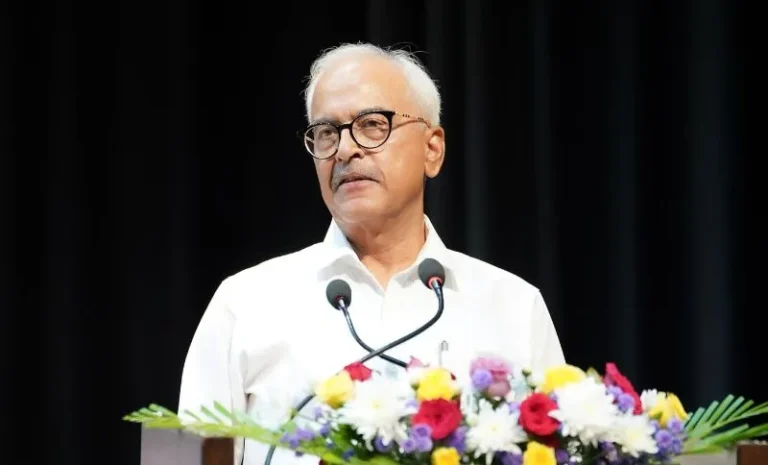Manipur MP Expresses Anguish Over Manipuri Language Missing Classical Language Status
Language is more than just a medium of communication; it is a reflection of culture, history, and identity. For the people of Manipur, the Manipuri language (also known as Meiteilon) holds this deep cultural significance. However, a recent event has caused a stir among the Manipuri community: the denial of classical language status to Manipuri. This decision has sparked disappointment and anguish, notably from Rajya Sabha MP Leishemba Sanajaoba, who voiced his concerns regarding the neglect of one of India’s oldest languages.
Summary of the News
Manipur’s Rajya Sabha MP Leishemba Sanajaoba has expressed deep disappointment after the Manipuri language failed to gain the coveted classical language status in India. Despite Manipuri’s rich heritage and ancient origins, the language continues to be overlooked for such recognition, which has led to widespread dissatisfaction among the people of Manipur.
Understanding the Issue: Why Manipuri Deserves Classical Language Status
What is Classical Language Status?
In India, classical language status is an official recognition awarded to languages that meet certain criteria, such as antiquity, a rich literary tradition, and historical significance. This status is more than just a title; it brings with it benefits such as funding for academic research, promotion of the language, and cultural preservation efforts.
Currently, India recognizes six classical languages: Tamil, Sanskrit, Kannada, Telugu, Malayalam, and Odia. These languages have long-standing literary traditions and historical importance. The push for Manipuri to be added to this list stems from its similarly ancient roots, unique script, and rich oral and literary traditions.
The Antiquity of Manipuri Language
Manipuri, also known as Meiteilon, is one of the oldest languages spoken in India, with a documented history that dates back over 2,000 years. The language is primarily spoken by the Meitei people, who make up the majority of Manipur’s population. It is the official language of the state and is written in the Meitei script, an ancient script that is deeply rooted in the region’s culture and history.
The Manipuri language has a rich literary tradition, with ancient texts, folklore, and oral narratives passed down through generations. It also has a distinctive classical dance form, Manipuri, which is recognized globally as one of India’s classical dances. The language is not only a vehicle for day-to-day communication but also serves as a repository of the cultural and historical legacy of the Manipuri people.
Why Manipuri’s Exclusion is a Point of Contention
Manipuri’s exclusion from the list of classical languages has stirred emotions for several reasons:
- Cultural Significance: Manipuri is an integral part of the cultural identity of the Meitei people and other ethnic groups in Manipur. The language has evolved over centuries, preserving the history and traditions of the people. Many argue that it deserves classical language status because it embodies the rich cultural heritage that is central to Indian diversity.
- Academic and Literary Value: Manipuri has an extensive body of literature, ranging from ancient texts to modern works. Many scholars have studied its linguistic structure, historical development, and unique features, which are comparable to other classical languages that have already been recognized.
- Recognition of Identity: For the people of Manipur, language is closely tied to identity. In a region that has often felt marginalized from mainstream national narratives, the recognition of Manipuri as a classical language would be seen as an acknowledgment of their unique contribution to India’s cultural fabric.
Leishemba Sanajaoba’s Reaction
Rajya Sabha MP Leishemba Sanajaoba expressed his disappointment over the exclusion of Manipuri from the classical language list, despite the concerted efforts made by various stakeholders to secure this recognition. In his statement, Sanajaoba highlighted the historical and cultural significance of Manipuri and emphasized that the language has all the necessary attributes to be considered classical.
Sanajaoba, who is also a titular king of Manipur, took this as a personal and cultural slight to his people, as the language is deeply intertwined with the identity of the Manipuri people. He mentioned that the Manipuri language had met the criteria set for classical languages and that its exclusion was a significant blow to the efforts to preserve and promote the language.
His anguish reflects the broader sentiment of the people of Manipur, who feel that their language and culture have been overlooked at the national level, despite their historical contributions.
Criteria for Classical Language Status: How Does Manipuri Measure Up?
To be considered for classical language status in India, a language must meet the following criteria:
- Antiquity: The language must have a documented history of 1500 to 2000 years.
- Rich Literary Tradition: The language should have a substantial body of ancient texts and literature, with the literary tradition being independent and not borrowed from another tradition.
- Originality: The literary works should have high aesthetic and intellectual value.
- Cultural Heritage: The language must have a significant role in shaping the cultural heritage of the country.
When comparing these criteria to Manipuri, it’s clear that the language qualifies:
- Antiquity: Manipuri has a history that spans over 2,000 years, with a continuous tradition of oral and written literature.
- Literary Tradition: The Manipuri literary tradition is rich, including ancient scripts, ballads, folklore, and dance dramas that have been passed down through generations.
- Cultural Heritage: Manipuri culture, including its classical dance form and music, plays a vital role in India’s cultural diversity. Its festivals, religious ceremonies, and social practices are all deeply rooted in its language.
Given these facts, many feel that the rejection of Manipuri for classical language status is not based on merit but rather due to political or bureaucratic oversight.
What Does Classical Language Status Bring?
Achieving classical language status would bring several benefits to Manipuri, including:
- Government Support: Once a language is declared classical, it receives significant funding for academic research, preservation, and promotion. This can help develop educational programs and encourage scholars to engage in research about the language’s literature, history, and structure.
- Promotion of the Language: Classical language status often elevates the importance of the language on the national stage. It would bring greater visibility to Manipuri and help preserve it for future generations.
- Cultural Preservation: The recognition of Manipuri as a classical language would be a step towards safeguarding the rich cultural heritage of Manipur. It would ensure that the language, along with its associated traditions, literature, and art forms, are given the attention and resources they need to thrive.
The Way Forward: What Can Be Done?
The battle for classical language status for Manipuri is not over. Advocates for the language will continue to push for recognition, citing its historical and cultural significance. Here are some of the steps that could be taken:
- Strong Advocacy: Leaders from Manipur, both political and cultural, need to continue their advocacy for the language, raising the issue at national forums and ensuring that the case for Manipuri is heard.
- Increased Academic Focus: By encouraging scholars to engage in research on Manipuri’s history, literature, and linguistic structure, more evidence can be presented to support its case for classical status.
- Public Awareness: Raising awareness about the Manipuri language’s rich history and contribution to Indian culture can help generate national support for its recognition.
FAQs
- Why is Manipuri not recognized as a classical language yet? Despite its antiquity and rich literary tradition, Manipuri has yet to be granted classical status, likely due to bureaucratic and political factors.
- What are the benefits of classical language status? Classical language status brings government funding for academic research, cultural preservation, and educational programs.
- How old is the Manipuri language? The Manipuri language has a documented history of over 2,000 years, making it one of the oldest languages in India.
- What other languages have classical status in India? Currently, six languages hold classical status: Tamil, Sanskrit, Kannada, Telugu, Malayalam, and Odia.
- What can be done to promote the recognition of Manipuri as a classical language? Continued advocacy, increased academic research, and raising public awareness can help push for its recognition as a classical language.



